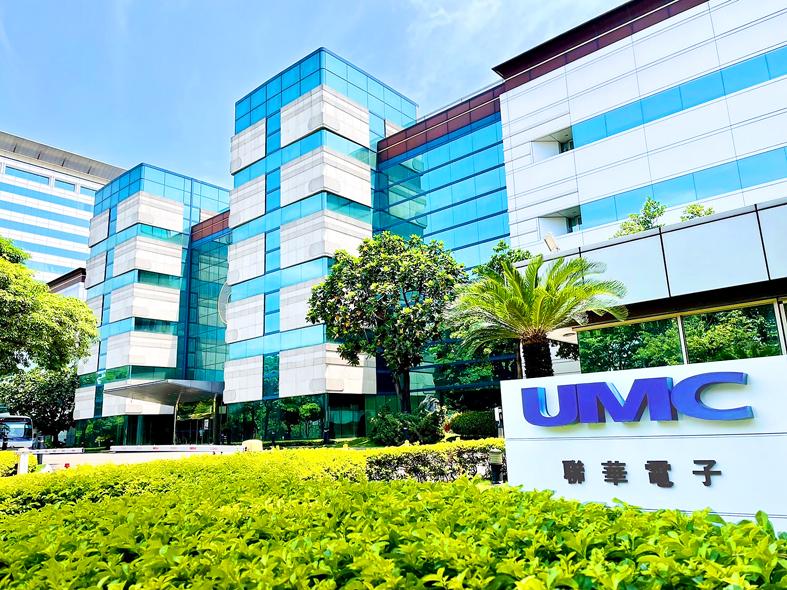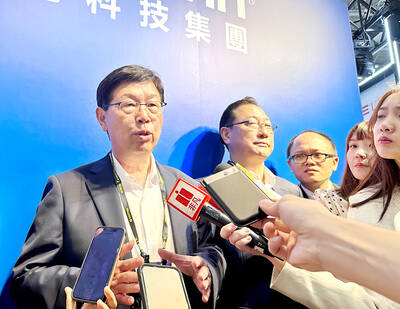United Microelectronics Co (UMC, 聯電), the world’s No. 2 foundry service provider, yesterday posted record net profit for last quarter, as growing demand for automotive, server and networking chips helped offset weakness in the smartphone and notebook computer segments due to China’s lockdowns.
Orders for automotive, server and networking chips accounted for more than 20 percent of UMC’s revenue, it said.
Net profit last quarter soared about 90 percent to NT$19.81 billion (US$673.9 million) from NT$10.43 billion a year earlier and gained 24.2 percent from NT$15.95 billion the previous quarter, UMC said.

Photo: Grace Hung, Taipei Times
Gross margin jumped to 43.4 percent, exceeding its estimate of 40 percent and hitting the highest in about 22 years.
Despite the economic turbulence, UMC said it still aims for revenue to grow by at least 20 percent this year, given that 40 percent of its wafer capacity is under long-term supply agreements.
On Tuesday, UMC said it signed a supply agreement with Japan’s Denso Corp to build wafer capacity to produce automotive chips at UMC’s Japanese fab from next year.
“For 2022, it remains a challenge for us to meet rising demand. In the near term, neither demand nor inventory fluctuations at customers has imbalanced supply and demand for UMC,” UMC copresident Jason Wang (王石) told a quarterly meeting yesterday.
“Our outlook for 2022 remains solid,” Wang added.
UMC maintains its forecast that average selling prices are to increase 14 to 16 percent this year, Wang said.
The firm has raised this year’s capital expenditure to US$3.6 billion from an earlier budget of US$3 billion, as it adds more capacity at its Tainan and Singapore fabs.
UMC said that its capacity this year is expected to increase 20 percent, compared with last year.
The firm said it expects wafer shipments this quarter to be as much as 5 percent higher than last quarter, while wafer prices are expected to rise 3 to 5 percent.
Gross margin is expected to increase to about 45 percent this quarter, thanks to price hikes and a better product mix, it said, adding that factory utilization would be 100 percent.

Taiwan Transport and Storage Corp (TTS, 台灣通運倉儲) yesterday unveiled its first electric tractor unit — manufactured by Volvo Trucks — in a ceremony in Taipei, and said the unit would soon be used to transport cement produced by Taiwan Cement Corp (TCC, 台灣水泥). Both TTS and TCC belong to TCC International Holdings Ltd (台泥國際集團). With the electric tractor unit, the Taipei-based cement firm would become the first in Taiwan to use electric vehicles to transport construction materials. TTS chairman Koo Kung-yi (辜公怡), Volvo Trucks vice president of sales and marketing Johan Selven, TCC president Roman Cheng (程耀輝) and Taikoo Motors Group

Among the rows of vibrators, rubber torsos and leather harnesses at a Chinese sex toys exhibition in Shanghai this weekend, the beginnings of an artificial intelligence (AI)-driven shift in the industry quietly pulsed. China manufactures about 70 percent of the world’s sex toys, most of it the “hardware” on display at the fair — whether that be technicolor tentacled dildos or hyper-realistic personalized silicone dolls. Yet smart toys have been rising in popularity for some time. Many major European and US brands already offer tech-enhanced products that can enable long-distance love, monitor well-being and even bring people one step closer to

RECORD-BREAKING: TSMC’s net profit last quarter beat market expectations by expanding 8.9% and it was the best first-quarter profit in the chipmaker’s history Taiwan Semiconductor Manufacturing Co (TSMC, 台積電), which counts Nvidia Corp as a key customer, yesterday said that artificial intelligence (AI) server chip revenue is set to more than double this year from last year amid rising demand. The chipmaker expects the growth momentum to continue in the next five years with an annual compound growth rate of 50 percent, TSMC chief executive officer C.C. Wei (魏哲家) told investors yesterday. By 2028, AI chips’ contribution to revenue would climb to about 20 percent from a percentage in the low teens, Wei said. “Almost all the AI innovators are working with TSMC to address the

FUTURE PLANS: Although the electric vehicle market is getting more competitive, Hon Hai would stick to its goal of seizing a 5 percent share globally, Young Liu said Hon Hai Precision Industry Co (鴻海精密), a major iPhone assembler and supplier of artificial intelligence (AI) servers powered by Nvidia Corp’s chips, yesterday said it has introduced a rotating chief executive structure as part of the company’s efforts to cultivate future leaders and to enhance corporate governance. The 50-year-old contract electronics maker reported sizable revenue of NT$6.16 trillion (US$189.67 billion) last year. Hon Hai, also known as Foxconn Technology Group (富士康科技集團), has been under the control of one man almost since its inception. A rotating CEO system is a rarity among Taiwanese businesses. Hon Hai has given leaders of the company’s six